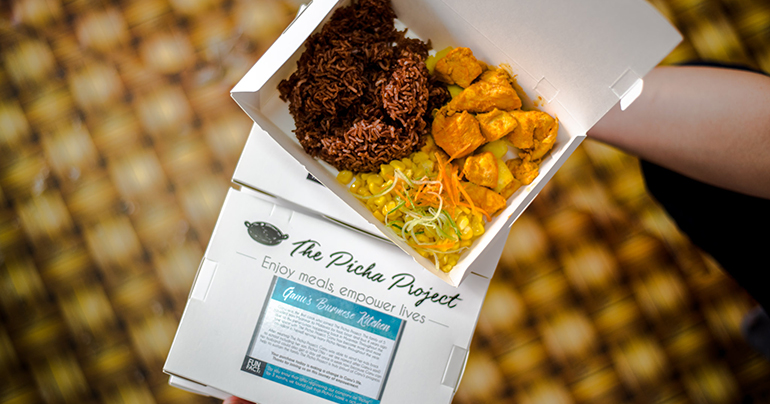Malaysia is a food nation. This was never more evident than in April of this year when UK MasterChef judge Greg Wallace described a contestant’s chicken rendang as “not crispy”. Malaysians all over reacted in horror at the comment and leapt to the defense of Malaysian-born contestant Zaleha Kadir Olpin, causing a social media storm that even saw the creation of the Facebook page Justice for Chicken Rendang.
If there is one thing that can unite Malaysians, it is food. And that is exactly what the Picha Project is banking on.
The social enterprise, launched in 2016, wants to empower marginalised communities in Malaysia through a sustainable food catering and delivery service.
The organisation is named after a three-year-old refugee from Myanmar named Pita (pronounced Picha).
“We met Pita when we were volunteering in a refugee learning centre and got to know the community,” said Kim Lim, who founded the project alongside Swee Lin and Suzanna Ling.
“Seeing that many kids were forced to drop out of school due to financial constraints back home, [we] thought something sustainable had to happen. Knowing that most of the mothers from the refugee community could cook, we tasted their food and thought that it would be great to be able to sell [it], so we started [the Picha Project],” Kim said.

Picha now works with 11 mothers – including Pita’s – from five countries. They come from the troubled or war-torn nations of Syria, Afghanistan, Palestine, Iraq and Myanmar, where they face some kind of persecution. For them, the Picha Project is a valuable lifeline.
Half of the revenue earned from catering events goes to the families, and the other half goes toward funding the project, including operations, transportation and packaging.
“We get refugees on board based on word of mouth or the communities that we know,” Kim said. “We tell them what we do, taste their food and vet their attitudes to make sure they are the right fit for Picha. Cooking at home helps [the refugees to] be safe, and also the orders they deliver will help them sustain their households – for example, paying rent, electricity and water bills, also sending their kids to school.”
There are over 158,000 refugees and asylum seekers registered with the UN refugee agency UNHCR in Malaysia, of which 73,900 are Rohingya from Myanmar. According to the Borgen Project, a US-based non-profit, many refugees in Malaysia “lack access to legal employment and formal education”. While they are able to access public and private healthcare, many are stymied by high costs and language barriers.
“Refugees are very much being discriminated [against] in our country [and] there’s no legal framework for them as well,” Kim said.
She added: “Sometimes, Malaysians regard them as people who bring disease into the country, dirty, or people who are here to steal our jobs. I believe Picha can definitely use sustainable solutions to bring awareness and acceptance [to] Malaysia.”
Aside from catering for events, the Picha Project hosts open houses with themes such as speed dating for Valentine’s Day, a forum on International Women’s Day and appetiser showcases during Hari Raya – the day that marks the end of Ramadan. It allows the communities to come together and try traditional foods from all around the world.
“Food is just like music, it connects people very easily,” Kim said. “[It] represents culture as well, therefore it is easier to converse and showcase culture through food. Malaysians love and appreciate food anyway, therefore using food as the connector was kind of a no-brainer.”


